- Home
- Sharyn McCrumb
The PMS Outlaws: An Elizabeth MacPherson Novel
The PMS Outlaws: An Elizabeth MacPherson Novel Read online
By Sharyn McCrumb
THE ELIZABETH MACPHERSON NOVELS
Sick of Shadows
Lovely in Her Bones
Highland Laddie Gone
Paying the Piper
The Windsor Knot
Missing Susan
MacPherson’s Lament
If I’d Killed Him When I Met Him …
The PMS Outlaws
If Ever I Return, Pretty Peggy-O
The Hangman’s Beautiful Daughter
She Walks These Hills
The Rosewood Casket
The Ballad of Frankie Silver
Bimbos of the Death Sun
Zombies of the Gene Pool
A Ballantine Book
The Ballantine Publishing Group
Copyright © 2000 by Sharyn McCrumb
All rights reserved under International and Pan-American Copyright Conventions. Published in the United States by The Ballantine Publishing Group, a division of Random House, Inc., New York, and simultaneously in Canada by Random House of Canada Limited, Toronto.
Ballantine and colophon are registered trademarks of Random House, Inc.
www.randomhouse.com/BB/
LIBRARY OF CONGRESS CATALOGING-IN-PUBLICATION DATA
McCrumb, Sharyn, 1948–
The pms outlaws : an Elizabeth MacPherson novel / Sharyn McCrumb.—
1st ed.
p. cm.
eISBN: 978-0-307-80088-6
1. MacPherson, Elizabeth (Fictitious character)—Fiction. 2. Women
forensic anthropologists—Fiction.
3.Forensic anthropology—Fiction. I. Title.
PS3563.C3527 P58 2000
813′.54—dc21
00-040374
v3.1
Contents
Cover
Other Books by This Author
Title Page
Copyright
Chapter 1
Chapter 2
Chapter 3
Chapter 4
Chapter 5
Chapter 6
Chapter 7
Chapter 8
Chapter 9
Chapter 10
Chapter 11
Chapter 12
Chapter 13
Chapter 14
Chapter 15
About the Author
Chapter 1
If he stayed chained naked to this post much longer, there just wouldn’t be any afterward to the foreplay.
Randy Templeton shivered in the soft darkness, wondering whether the girls would think him ungrateful if he called out to hurry them along. It was damp and nearly dark in the basement of the Lonesome Rose Bar, but mostly it was cold. People could say what they wanted to about extra body fat; the spare tire around his middle wasn’t doing a thing to keep him warm. He hated to think what shape he’d be in without it.
Whoever had air-conditioned the roadhouse had made a pitiful job of it, too. The barroom itself was hotter than a hubcap in August, while down here beneath, it felt like penguin heaven. If it weren’t so dark, he could probably see his breath. He wondered if the girls would mind the cold. He could suggest someplace more comfortable, but he didn’t want to ruin the spontaneity of the occasion. Besides, he wasn’t sure that motels in his price range took postdated checks.
Randy hoped there weren’t any rats around. He had seen a horror movie once where a guy was chained in a dungeon someplace, and rats had come out and started gnawing on his toes. Just thinking about it made him shiver even more than he already had been. He’d never hear rats over the thump of the jukebox from above. At least he had kept his boots on. He wriggled his wrists in the handcuffs, thinking they must be trick cuffs from a store that specialized in magic items and practical jokes, but the steel bands remained firmly shut, yielding no hidden catch. His fingers were beginning to feel numb. Real handcuffs … his mind shied away from any more speculation on this point. What with the cold and all, he was having a hard enough time maintaining the mood without going into philosophical suppositions about sexy and gorgeous chicks who carried regulation handcuffs.
Where were those two girls, anyhow? They said they’d gone off to slip into something leather and scanty, but he didn’t hear any giggles around the corner. The jukebox again, probably. Its base notes were rolling across the floor above him in a tidal wave of noise. What were those girls’ names again? He couldn’t quite remember. Maybe he should just stick to calling them “Honey” and “Darlin’ ”—women were so touchy about things like proper names. He didn’t want to spoil the evening, which was the most exciting thing that had happened to him since he’d got one of the lucky bottle caps in the drink machine at the plant and won a hundred bucks just in time to make a car payment.
He couldn’t believe his luck this time. He’d stopped in at the roadhouse after work for a quick one (by which he meant a drink), and before he could say “Colorado Kool-Aid” (by which he meant Coors), two good-looking women in jean shorts and halter tops had come up to him, one on each side, smiling up at him, until he began to wonder who they had mistaken him for. People did say he looked a little like Randy Travis in the right light—if he sucked in his gut and combed his hair forward over his bald spot.
He thought the game would be up when he told them his name. He said, “I’m Randy …” and for a few seconds he thought about saying, “… Travis,” but nervousness impaired his fluency in lying, and he had blurted out “Templeton,” the only word in his otherwise empty brain. They just kept smiling, as if they weren’t disappointed at all. Then they started making small talk, only instead of yelling loud enough to be heard over the music, they had whispered up close in his ear, until their tongues almost touched his earlobes. It warmed him up just thinking about it. He had made a few gallant remarks about how the two of them were prettier than … something or other.… He couldn’t quite remember what he had said, but it must have been good, because they had smiled knowingly at him and edged in even closer.
But there were two of them. One part of his mind kept waiting for them to ask him if he had a friend, while his remaining brain cells tried to choose which one he wanted and then decide how to get her away from her companion. One of them was a wiry-looking blonde who looked like she played softball or rode horses—a real tomboy; the other one was a top-heavy Miss America type, just shy of being plump, but with the few extra pounds distributed in some wonderful places. What were their names? They were pretty all right, but they weren’t the usual sort of girl that you saw in the Lonesome Rose. They talked like schoolteachers, now that he thought about it: all carefully pronounced words, with proper English as far as he could tell, and not much drawl in their voices. Maybe they were schoolteachers. Maybe those X-rated skin flicks he checked out from the Video Mart & Tanning Parlor, with titles like Lessons in Lust and Sex Ed at Honey High, were documentaries.
At that point in the conversation, Randy had been thinking that he could star in a skin flick called Horny Zombie in Deep Shock, when those two gorgeous creatures made it clear that he didn’t have to choose between them. He could have them both. They worked as a team, they said. Well, hot damn.
He had allowed himself to be led to the basement by these two whispering playmates, and his brain had pretty much been in neutral, while the rest of him was going into overdrive. While he was still speechless with astonishment, “Honey” and “Darlin’ ” had whispered intoxicating promises in his ear, and working in tandem they divested him of his clothes before he even had time to think about it.
“If you’ll put on these handcuffs, Sugar, we can have a real party,” said the wiry blonde.
“Like nothing you ever felt befo
re,” cooed the plump Miss America.
Speechless with lust and anticipation, he had made a gurgling sound in his throat and held up his wrists, eager for the games to begin.
That had been … oh … fifteen minutes ago. The chill of the darkened basement and the fear of creepy-crawly things he could not see had taken the edge off his eagerness for erotic games, but he was sure that the reappearance of those two luscious beauties would revive him again. Where were they, anyhow? He gave a tug on his handcuffs, but they held as tightly as ever.
“Hello, darlin’?” he called out tentatively into the darkness. Then he tried to cover his nervousness by making a joke of it. “That wasn’t a Conway Twitty imitation,” he said. “But it has been a long time. Are y’all about ready?”
There was no answer. The rumble of the jukebox continued uninterrupted above him.
“Sweet thangs?” he called out, a little louder now. “Are you coming? I’m handcuffed naked to this post here.”
A few minutes later, the silence had so unnerved him that he knelt down and picked up a discarded curtain rod to try to reach for his clothes. He distinctly remembered seeing one of the girls fold his clothes neatly and place them in the corner. After many minutes of futile prodding with the curtain rod in the dark corner, he had to face the unpleasant fact that his clothes and his wallet were gone.
Upstairs on the jukebox, the thunder of drumbeats had subsided, and, as if in mockery of his predicament, Randy distinctly heard Hank Williams’s voice crooning “I’m Walking the Floor over You.”
Chapter 2
“Twenty-five years ago, being
crazy meant something. Now
everybody’s crazy.”
—Charles Manson
“I’m in the living room of our house in Scotland, right? Edinburgh, near the Firth of Forth, which I couldn’t bear to look at any more. That cruel stretch of gray water …” The soft voice in the darkness faltered.
“Skip that part,” said the woman in the circle of lamplight.
“Okay.” A sharp intake of breath. “I’m okay now. Living room. The curtains are drawn. And I’m sitting on the sofa, reading a magazine, I think. I’m not too clear on that. I was alone, of course. I might have been watching television, but I doubt it. I don’t remember a television program. I was probably reading.”
“Go on, please.”
“So, anyway, in the silence I hear the front door open and close, and I practically jump out of my skin because I’m so startled. I’m thinking that an intruder has got into the house, and I’m wondering whether to run or to pick up the poker from the fireplace and go down fighting.”
“You think the person who has come in is an intruder?”
“A burglar, maybe. Someone who didn’t belong there, anyhow. And I’m wavering between fight or flight.”
“Which option did you choose?”
“Well, neither of them, really. It all happens too fast. I get up from the sofa, and I take a few steps toward the front hall to see who’s there, and then I start to scream.”
“In terror?”
“No. Shock. I’m rooted to the spot, waiting to see who it is. And then I’m laughing and crying at the same time, because there in the hall, dripping wet in his old mackintosh and muddy boots is my husband, Cameron Dawson. He went away on an expedition in the North Sea weeks and weeks ago, in a tiny, dilapidated boat, and no one had heard from him since. The boat is missing. He’s gone. So, of course, I’ve been just out of my mind with grief and fear. We had been married only a couple of years, and I had just about given up on him. Then, without a word of warning, the door just opens and in he walks, with a scruffy beard and a sheepish grin, like ‘Hi, honey! I’m back,’ as if he had only been gone for the afternoon. And I’m too stunned to yell at him for scaring me half to death. I throw myself into his arms, still screaming for joy.”
“And then what?”
Elizabeth MacPherson’s voice quavered. “And then … I wake up.”
Cherry Hill Psychiatric Hospital
Thursday. Or not.
Dear Bill,
I am as well as can be expected, I suppose. After weeks and weeks of being unutterably weary, and unwilling to stir from my bed, I finally got tired of all the collective nagging from family and friends, and I took myself back to see Dr. Freya. We had been talking about Cameron for weeks already, so she knew about his disappearance, and all my emotional problems resulting from it. But suddenly the fact that he was gone just hit me so hard. I told her about the dream. Over and over, I dream that he comes walking back through the door of our house in Edinburgh. I told her that whenever I tried to read, I’d find myself skimming the same page over and over and I couldn’t remember what I’d read.
“Anything else?” she said in that brisk tone of hers, as if she were a mechanic checking out a carburetor.
“Well … There’s the fact that I can’t seem to stop crying,” I said.
“I see.”
“It’s been weeks since it happened, but I’m worse now than I was when Cameron first disappeared,” I told her.
“Yes. It happens like that,” Dr. Freya said.
I shredded the sodden tissue I’d kept balled in my fist. “I guess I’m losing my faith.”
She shook her head. “It isn’t a bad sign. Perhaps you are … accepting. No longer in denial.”
Well, at that I started to cry again, because I realized that nobody thought Cameron was coming back. I had been subconsciously hoping that Dr. Freya would say something about teaching me deep breathing and meditation exercises to keep me calm until Cameron’s rescue, but she was treating me like a bereavement case. As if I were a—a widow. I cried even louder. Said I didn’t want to live any more.
She sat there in silence for maybe a minute—it seemed like a month—while I groped for more tissues and tried to get a grip on myself, and then she said, “I think you should go someplace for a rest.”
Very ominous remark, that, coming from your shrink. Between sobs I said, “A rest? Where?”
“Cherry Hill,” she said.
When I took a sudden gulp of air and started to laugh, Dr. Freya sighed and began to make little notes on her legal pad, but I assured her I wasn’t becoming hysterical. It really was funny.
“You heard of it?” she asked me.
“Heard of it?” I hooted. “Cherry Hill is my family’s Club Med. Our vacation spot of choice. My delusional cousin Eileen was in there for ages, and I think her brother, Charles, went in once for a couple of weeks to see if they could talk him out of wanting to be a physicist, and then Aunt Amanda went in for her drinking problem. Mother took some counseling sessions there after the divorce to figure out why she wasn’t attracted to women.… They were no help, though. Mel Gibson still makes her drool. Why, Cherry Hill is like a second home to our family. We ought to hold the reunions there.”
Dr. Freya ignored me. She always does when I babble. “It’s a fine treatment center, particularly for depression,” she said briskly. “I’d like you to check yourself in as a voluntary patient. As you move from denial into the other stages of loss, you will need to receive more intensive therapy for grief and depression. At such a time you should not be alone.”
“I’m not alone!” I said indignantly. “I have my family.…” Daddy with his new girlfriend, and Mother busy finding herself, you in a law practice a couple of states away, and Cameron’s family in Scotland—and not really connected to me any more, except by bad memories. “I’ll go home and pack,” I mumbled.
So here I am at Cherry Hill. I don’t remember if you’ve been here or not. As a visitor, I mean. I’d certainly recall if you had been a patient. Did we visit Cousin Eileen here when we were teenagers? I don’t think so. Aunt Amanda was very much in denial about Eileen’s mental condition, as I recall. I believe she was referring to Cherry Hill as a finishing school in those days. How very appropriate in my case. I am here because something in my life needs to be finished, and I hope they can teach me how t
o manage it.
Bill MacPherson set down the letter from his younger sister, Elizabeth. “She’s checked herself into Cherry Hill Hospital,” he murmured. “Voluntary commitment for depression. Poor kid. I wonder if I should go down there?”
His law partner shrugged. “Maybe later. Just now I don’t think you’d be much help. Men never are with other people’s troubles. Your sister has lost her husband, and she’s getting professional help, which is very sensible of her. Unless she asks you to visit, I think you ought to leave her alone to get on with it.”
Bill MacPherson looked relieved. “I probably wouldn’t be any use,” he admitted.
“Probably not. Send her flowers if it makes you feel any better.”
A. P. Hill balanced her coffee mug on the edge of the table and sat down in the plastic chair next to Bill’s desk. She looked with disfavor at her partner’s shabby office, with its Bargain Barn metal office furniture, dusty plastic plant, and a crisp, white William & Mary law degree on the dingy beige wall. “Somebody ought to send me flowers,” she muttered. “I have to work in the black hole of Calcutta. If that isn’t depressing, I don’t know what is.”
“What’s depressing?”
A. P. Hill waved her hand to indicate the general squalor of Bill’s office. “Look at this place.”
“I’m not cleaning it,” said Bill warily, trying to edge between his partner and her view of his cluttered desk.
“No. Cleaning it wouldn’t help. At least the dust is organic.” She pointed at the plastic plant and shuddered. “I mean, look how small this place is. And how shabby. My office isn’t any better. Except that I don’t have a stuffed groundhog in a dress on the top of my filing cabinet.” She turned her head to look at the offending object and shuddered again. “This whole building is a disaster. Sometimes I think the best way for us to drum up business for a criminal practice would be to loiter outside in the halls.”
“Yes,” said Bill, “you’d certainly meet people who need lawyers out there, but they probably couldn’t afford us. Unless you’d take a pillowcase full of silverware for a retainer. Still, when we graduated from law school, you said you wanted to set up your own practice. You didn’t want to go into a law firm full of—what did you call them?”

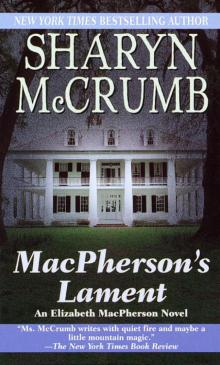 Elizabeth MacPherson 07 - MacPherson’s Lament
Elizabeth MacPherson 07 - MacPherson’s Lament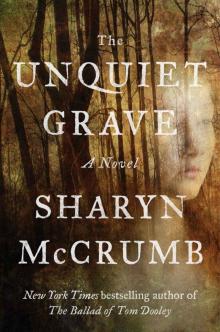 The Unquiet Grave: A Novel
The Unquiet Grave: A Novel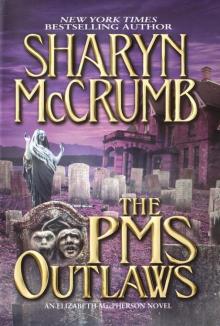 The PMS Outlaws: An Elizabeth MacPherson Novel
The PMS Outlaws: An Elizabeth MacPherson Novel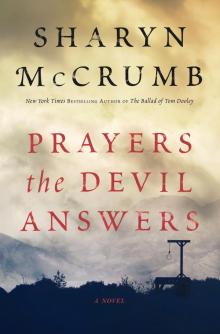 Prayers the Devil Answers
Prayers the Devil Answers Paying the Piper
Paying the Piper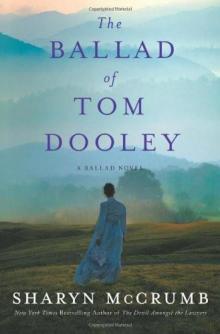 The Ballad of Tom Dooley: A Ballad Novel
The Ballad of Tom Dooley: A Ballad Novel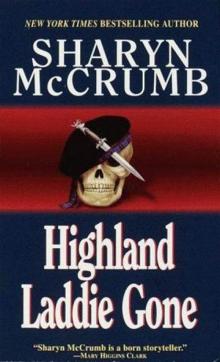 Highland Laddie Gone
Highland Laddie Gone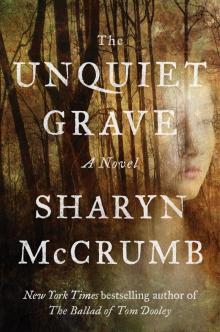 The Unquiet Grave
The Unquiet Grave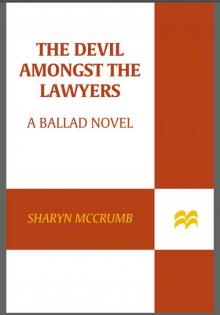 The Devil Amongst the Lawyers
The Devil Amongst the Lawyers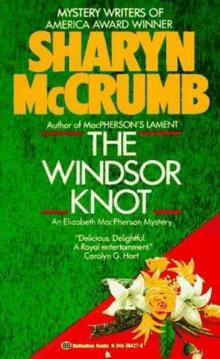 The Windsor Knot
The Windsor Knot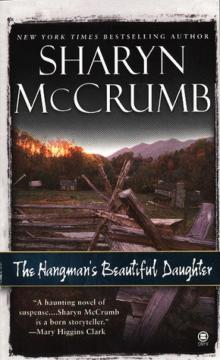 The Hangman's Beautiful Daughter
The Hangman's Beautiful Daughter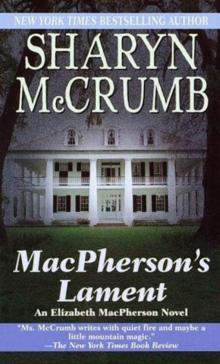 MacPherson's Lament
MacPherson's Lament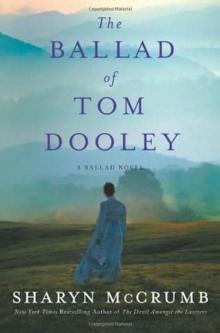 The Ballad of Tom Dooley
The Ballad of Tom Dooley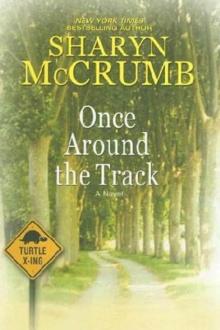 Once Around the Track
Once Around the Track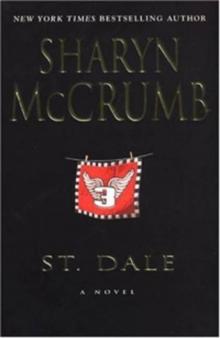 St. Dale
St. Dale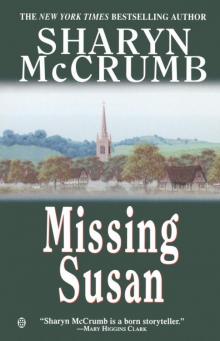 Elizabeth MacPherson 06 - Missing Susan
Elizabeth MacPherson 06 - Missing Susan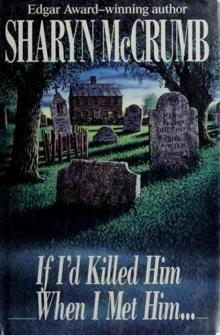 If I'd Killed Him When I Met Him…
If I'd Killed Him When I Met Him…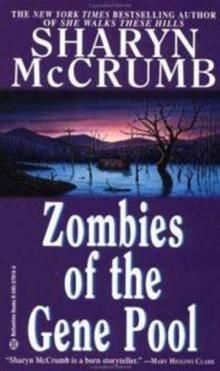 Zombies of the Gene Pool
Zombies of the Gene Pool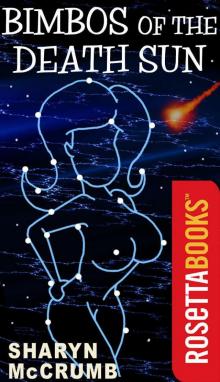 Bimbos of the Death Sun
Bimbos of the Death Sun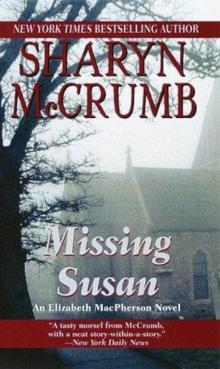 Missing Susan
Missing Susan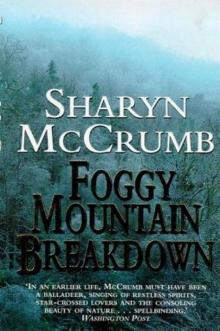 Foggy Mountain Breakdown and Other Stories
Foggy Mountain Breakdown and Other Stories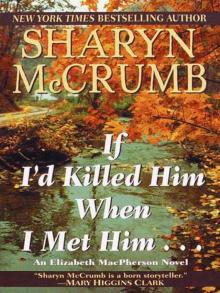 If I'd Killed Him When I Met Him
If I'd Killed Him When I Met Him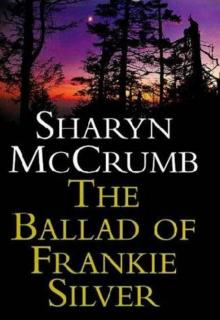 The Ballad of Frankie Silver
The Ballad of Frankie Silver Lovely In Her Bones
Lovely In Her Bones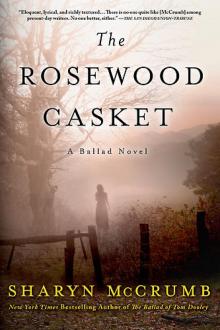 The Rosewood Casket
The Rosewood Casket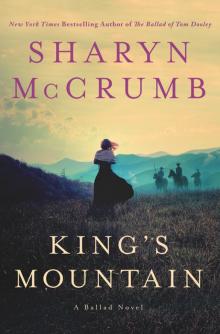 King's Mountain
King's Mountain